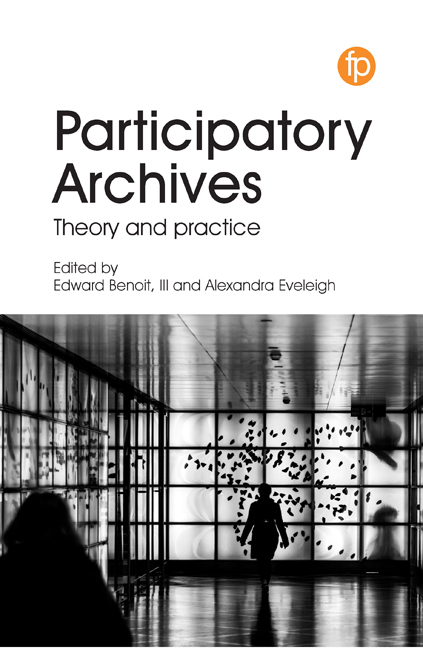Book contents
- Frontmatter
- Contents
- Figures and table
- Notes on contributors
- 1 Defining and framing participatory archives in archival science
- SECTION 1 SOCIAL TAGGING AND COMMENTING
- SECTION 2 TRANSCRIPTION
- SECTION 3 CROWDFUNDING AND OUTREACH
- SECTION 4 ALTERNATIVE AND ACTIVIST COMMUNITIES
- 14 Degrees of mediation: a review of the intersectionality between community and participatory archives
- 15 Activist participatory communities in archival contexts: theoretical perspectives
- 16 Documenting a social movement in real time: the Preserve the Baltimore Uprising 2015 archive project
- 17 Community partnerships and collection development in the Legacy of Ahmed Project
- 18 Challenges, opportunities and future directions of participatory archives
- Notes
- Index
14 - Degrees of mediation: a review of the intersectionality between community and participatory archives
from SECTION 4 - ALTERNATIVE AND ACTIVIST COMMUNITIES
Published online by Cambridge University Press: 25 October 2019
- Frontmatter
- Contents
- Figures and table
- Notes on contributors
- 1 Defining and framing participatory archives in archival science
- SECTION 1 SOCIAL TAGGING AND COMMENTING
- SECTION 2 TRANSCRIPTION
- SECTION 3 CROWDFUNDING AND OUTREACH
- SECTION 4 ALTERNATIVE AND ACTIVIST COMMUNITIES
- 14 Degrees of mediation: a review of the intersectionality between community and participatory archives
- 15 Activist participatory communities in archival contexts: theoretical perspectives
- 16 Documenting a social movement in real time: the Preserve the Baltimore Uprising 2015 archive project
- 17 Community partnerships and collection development in the Legacy of Ahmed Project
- 18 Challenges, opportunities and future directions of participatory archives
- Notes
- Index
Summary
Scholarly interest in community and participatory archives grew rapidly with the advancement of Web 2.0 technologies in the mid-2000s, although it had existed previously. Similar to digital archives, the growth itself outpaced discussions of unique characteristics for both. There are numerous, often overlapping though sometimes contradictory, definitions of participatory and community archives. Both are often community centred and self-defined. Flinn states:
Definitions of what a community might be, or what a community archive is and what it might be taken to include are not necessarily clear or fixed. Indeed, these terms might go unused and unrecognized by many working in community projects and in mainstream archive and heritage institutions. Other similar, if not exactly synonymous terms which are also frequently used include local history group, oral history project, community history project and community memory project.
Because of the extensive overlap between community and participatory archives, the term ‘participatory archives’ will be used as a catch-all term for the purposes of simplicity for the rest of this chapter.
As the profession moves into what Cook describes as the community paradigm of archives, there is evidence of democratisation of archival power. Gabriel and Jensen observe, ‘Information professionals such as librarians and archivists are no longer the sole authorities in the distribution, presentation, and retrieval of information.’ This is quite clear in the many iterations of par - ticipatory archives. Though many participatory archives include professional and institutional mediation, countless others are independent and autonomous archives run by their participants and community members.
First are mediated projects, those participatory archives where at least some amount of control is held by a mainstream museum, library or archival institution. While many mediated participatory archives may share similarities, there is by no means a one-size-fits-all approach to these projects and programmes. For some projects, mediation is very visible, and the mediating institution mainly guides the project. In other cases, the mediating institution has a more hands-off approach. Additionally, some forms of outside mediation can occur even in mostly independent community archives. For example, the Community Archives and Heritage Group from the Archives and Records Association of UK and Ireland provides support for community archives in the UK and Ireland.
- Type
- Chapter
- Information
- Participatory Archives , pp. 159 - 172Publisher: FacetPrint publication year: 2019
- 3
- Cited by



